New publications
Fiber improves brain function
Last reviewed: 29.06.2025

All iLive content is medically reviewed or fact checked to ensure as much factual accuracy as possible.
We have strict sourcing guidelines and only link to reputable media sites, academic research institutions and, whenever possible, medically peer reviewed studies. Note that the numbers in parentheses ([1], [2], etc.) are clickable links to these studies.
If you feel that any of our content is inaccurate, out-of-date, or otherwise questionable, please select it and press Ctrl + Enter.

Prebiotic supplements - dietary fiber inulin and plant fructooligosaccharides alter the gut microbiome, help reduce neuroinflammation, improve recovery from brain injury and attenuate the development of Alzheimer's disease by reducing beta-amyloid levels in the brain, and help improve memory.
According to the World Health Organization, the world's population is aging at a faster rate than in the past and people are living to a much older age. The number of people aged 60 and over worldwide was about 1.4 billion in 2022 and is expected to reach 2.1 billion by 2050.
In some cases, diseases such as dementia and alzheimer's disease, can cause cognitive decline. This can lead to more serious problems, including memory loss, inability to plan or solve problems, difficulty speaking or writing, mood changes, anxiety, sleep problems and confusion about places, dates and times.
While there is currently no cure for dementia or Alzheimer's disease, healthy lifestyle choices and certain medications can help slow their progression.
Now researchers from King's College London have found that taking dietary fiber supplements may help improve brain function in older adults.
For this study, researchers recruited 36 pairs of twins over the age of 60. One twin in each pair was given a fiber supplement daily for 12 weeks, while the other twin received a placebo.
The study was a double-blind study in which neither the analytic team nor the study participants knew what they were getting until the study was completed.
At the end of the study, the researchers found that the group that received the fiber supplement had improved performance on tests to assess brain function, including the Paired Associations Memory Test, an early marker of Alzheimer's disease, as well as tests of reaction time and speed of information processing.
"We were pleasantly surprised to find that those who received the prebiotic supplement showed improvements in memory and thinking tests compared to placebo over a 12-week period," said Dr. Steves. "We know there is a link between gut bacteria and the brain, so this study provides further evidence of that connection and is extremely promising."
"I would encourage readers to think of fiber as part of a holistic approach to nutrition, meaning it is just one component of all the nutrients and diverse compounds we need for a healthy gut. Fruits, vegetables, beans, nuts, seeds and whole grain products) that you love and will eat are especially rich in fiber. The following common vegetables are rich in prebiotic fiber: garlic, onions/leeks/shallots, asparagus, beets, fennel, green peas, corn and cabbage. A good source of prebiotics are legumes: chickpeas, lentils, beans and soybeans. Fruit sources include apples, nectarines, peaches, persimmons, watermelon, grapefruit and pomegranate. Whole-grain foods include barley, rye, wheat and oats. Cashews and pistachios are also rich in prebiotic fiber." said Richard, one of the researchers."
Details of the paper can be found on the journal's webpage at nature Communications.
